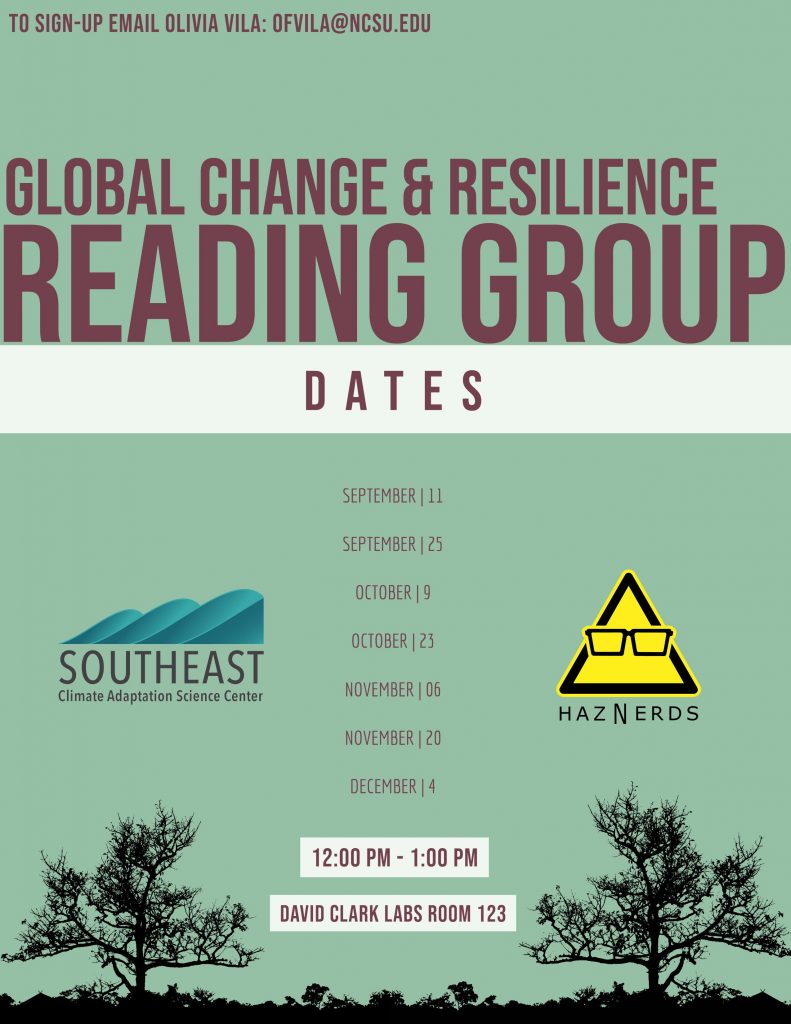Recap: Global Change and Resilience Reading Group – Exploring Ecosystem-Based Solutions for Disaster Risk Reduction
The SE CASC and HazNerds recently launched the Global Change and Resilience Reading Group, open to all interested students and faculty in the Triangle area. This group was created with the intent of collaborating across disciplines to discuss current publications on the topics of global change and resilience. Interested in attending the next meeting? The group will meet next on September 25th at 12:00pm in 123 David Clark Labs. Be sure to sign up here and the article of the week will be sent directly to your inbox!
The first Global Change and Resilience Reading Group meeting was successfully held on September 11th with representation from the NC State departments of Marine, Earth, and Atmospheric Sciences, Biological Sciences, Civil Engineering, and the Southeast Climate Adaptation Science Center. Professors, faculty, students, and former global change fellows gathered to discuss the article, Ecosystem-based solutions for disaster risk reduction: Lessons from European applications of ecosystem-based adaptation measures. This paper outlines the connectedness among ecosystem-based adaptation (EbA) and disaster risk reduction (DRR) and explores various co-benefits that may result from a synergistic approach between climate change adaptation (CCA) and DRR. The authors highlight the common goals that EbA and DRR share, offering specific examples of European countries that embraced the incorporation of green infrastructures into an integrated approach to EbA and DRR.
A major focus of this paper involves how DRR and EbA can generate multiple benefits, or co-benefits across multiple ecosystems and scenarios. For example, restoring coastal wetlands, mangroves, and coral reefs has the potential to both revive those ecosystems and reduce the vulnerability to and impact of storm surges in those areas. These co-benefits, in-turn, can be critical for securing funding from diverse sources and engaging various stakeholders.
The authors review case studies of applications of EbA in Europe and use those studies to explore how they address multiple climate hazards and discuss cost-effectiveness. Their analysis shows that the cost of these efforts are typically measured by the cost of implementation – easily accessible and quantifiable measures that we are familiar with. However, the trickier and much less consistent aspect involves evaluating and placing a value on the benefits of these projects.
The authors present a variety of reasons why this is difficult and provide examples of the many inconsistent ways benefits and co- benefits are and can be calculated across projects. To make things more complicated, the authors also discuss that there are costs, beyond implementation costs, which are not often considered or calculated. For example, some ecosystem based adaptation measures, such as water retention methods, may lead to increased pests, which could have impacts on human well-being or animal health. Likewise, some coastal measures could lead to fewer recreational and tourism opportunities. As the group broke into pairs to begin sharing ideas and opinions of the publication, they deliberated the following questions:
- Let’s hypothetically say we were going to develop a comprehensive model of costs and benefits for a project. Discuss some potential benefits and costs, informed by your disciplinary perspective that you think would be important to consider in that comprehensive model. What stakeholders would be interested in these benefits?
- What are some barriers to measuring these co-benefits? What could be some strategies to address these barriers?
- Is it important to consider all the potential benefits, co-benefits, costs (direct and indirect?). How do we decide which benefits and costs to include in project estimates? [Consider the purpose of these cost-benefit analyses].
Overall, this article allowed for an exciting and thought-provoking discussion with input from a wide range of disciplines. We’re looking forward to next week’s meeting where we will discuss Matches and Mismatches Between Global Conservation Efforts and Global Conservation Priorities.

- Categories:
